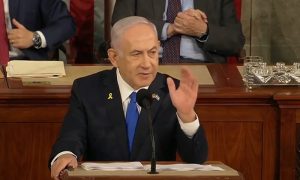 “Towards an Understanding of US Foreign Policy in the Middle East: Making Sense Out of the Chatter” (Part 1 of 3)
“Towards an Understanding of US Foreign Policy in the Middle East: Making Sense Out of the Chatter” (Part 1 of 3)
by Barry Grossman*
The first problem with writing in “broad brush” strokes about US foreign policy in the Middle East stems from the fact that there is no single organ from which these policies emanate. Much of what comprises US foreign policy in reality originates from outside the political apparatus and is cloaked with a false notion of National Security.
The extent to which geopolitical policies, tactics and strategies are driven by the security apparatus and by corporate interests which by definition have little loyalty to the American people, can hardly be overstated.
Also Read: Boycott of Zionism, The Most Powerful Weapon
The incumbent President – whoever it might be from time to time – is arguably in a worse position than your average discerning internet warrior when it comes to understanding the opaque stew of American policy and its various machinations as applied in the Middle East.
The President is no Olympian but rather a lone and very busy mortal who, by the nature of his position, is constrained by political debts, beholding to public opinion and has only a very limited ability to change the direction of policy at the margins.
Like the rest of us, every day the President must sleep, eat, spend time with his family and take time for toiletries. He does not have time to spend endless hours pouring over all available sources of information on any subject. When he is not dealing with the mundane realities of being mortal or addressing the myriad obligations imposed by his fully pre-booked and carefully managed agenda, he relies on executive summaries, classified briefings and instructions from what is invariably a diverse cabinet which draws on a vast array of mostly corporate funded experts for “expertise.”
A New Type of Ruler
Also Read: Nuclear Technology: Harm and Benefit from the Qur’anic Perspective
William Burroughs, though an infamous miscreant certainly not worthy of commendation, found a moment of clarity writing on the subject in 1952:
“We have a new type of rule now. Not one-man rule, or rule of aristocracy or plutocracy, but of small groups elevated to positions of absolute power by random pressures and subject to political and economic factors that leave little room for decision. They are representatives of abstract forces who have reached power through surrender of self. The iron-willed dictator is a thing of past. There will be no more Stalins, no more Hitlers. The rulers of this most insecure of all worlds are rulers by accident. Inept, frightened pilots at the controls of a vast machine they cannot understand, calling in experts to tell them which buttons to push.”
The second problem encountered when writing about US policy in anything but adoring terms and without producing a virtual encyclopaedia of minutia and verified references, is that generalised comments critical of US policy will invariably be dismissed as coming from the lunatic fringe. Yet if we frame our criticism by writing in boring, scholarly fashion about foreign policy minutiae, our critics claim that we cannot see the forest for the trees. It certainly does not help that any mainstream public dialogue tends to be almost entirely controlled by a political machine and mainstream media which have both been tacitly suborned to agendas defined by corporate interests and the security apparatus.
Our efforts to expose the wider tendencies of US foreign policy are also not helped when invariably much of the well intentioned commentary from alternative sources all too often “over shoots” the mark and becomes mired in conspiratorial claims born of reductionist thinking and a poor understanding of the decision making process in government.
Also Read: Gaza Cries Out, the World Stays Silent: A Wounded Humanity
That said, in this era of “psyops” and “asymmetric warfare” it is often difficult to know whether some of the more colourful claims from the so-called fringe are conceived by ordinary folk or encouraged by elements within the security machine as part of an agenda to at once distract ordinary folk and at the same time discredit genuine critics.
Finally, bearing the above problems in mind, a further problem arises from most people’s assumption that US foreign policy is coherent. While it can be analyzed and to some extent understood both in its specifics and in its wider sweeping agendas, the wider political processes by which policy is formulated mean that it is in many ways every bit as incoherent and unpredictable as implied by Burroughs closing remark: “The rulers of this most insecure of all worlds are rulers by accident. Inept, frightened pilots at the controls of a vast machine they cannot understand, calling in experts to tell them which buttons to push.”
The first thing any arm chair pundit should take account of is that the mainstream public dialogue invariably starts from the premise that the presumed aims of US foreign policy are legitimate and that this presumed legitimacy some lends further legitimacy to the myriad tactics used to advance US aims. In reality, common sense should tell us that since foreign policy is by definition concerned with intervening in the affairs of other nations by both open and clandestine means, the starting point should at the very least be neutral or, taking into account America’s woeful record of improper clandestine intervention in dozens of nations since WW2, should go further by imposing something of reverse onus on the US to justify each and every foreign policy position.
New World Order
Also Read: Indo Defence Expo and Forum; Sharing Responsibility of Humankind and Environment
That the US routinely violates all principles of international law and holds itself above the sovereignty of all other nations through its policy of US exceptionalism only serves to confirm just how all pervasive commitment to the US led New World Order paradigm glossed over in speeches by President George H. Bush and so many other compliant political leaders has become.
To understand US foreign policy, we must recognize that the overriding imperative embraced by the US political and security apparatus is to advance and, when deemed necessary, impose a US centric view of how the world should be ordered. There are, of course, competing normative positions in the US about what this view comprises.
The dominant Neoliberal view (which is anything but liberal) is essentially corporatist in outlook, while the related though somewhat different Neocon view incorporates various ideological positions including US supremacy, corporatism, Zionism and socioeconomic views which cover the spectrum from “left” to “right.” A third rail reflected by the likes of George Soros and various disorganised protest movements is no less US centric but advances on the coat tails of what have traditionally been liberal agendas.
It is no accident that, for the most part, US foreign policy is expressed as a set of tactical positions which are a means to an end rather than the end itself. There are endless tombs, made of both paper and stone, which stand as a testament to the tactics by which this US led NWO is advanced; but there is almost no coherent or detailed discussion of what this NWO is meant to comprise apart from hackneyed appeals made in the name of freedom. The opaque curtain used to shroud the US’s Roman styled New World Order ambitions should echo as a clarion call to be on guard against this Trojan Horse.
Also Read: Safiya Saeed: From Somali Migrant to First Hijab-Wearing Mayor of Sheffield
When grappling with the vast edifice of news reports, policy statements, journal articles, official documents, “Think Tank” studies and current events in order to glean some insight into US policy, it helps to excavate through the chatter in order to arrive at the core tenets or structural components of US foreign policy. When we do this, four dominant imperatives emerge which form the structural columns of US policy Middle East, along with a fifth column which even by US standards, stands uncomfortably with the others:
1.US Hegemony;
2.US Exceptionalism;
3.US interests in other peoples’ Oil/Energy;
Also Read: Why Food Safety is Essential During Hajj Services?
4.US Corporatism & Globalization; and
5.Zionism.
Somewhere further down the list, we encounter some genuine US concern for opposing regional corruption and for promoting an export version of US styled democracy, complete with its hackneyed concern for the “rule of law” and human rights, as long as any such aspirations are not perceived as detracting from the aforementioned structural imperatives.
To continue the “classical building” metaphor, concerns for democracy, human rights and the “rule of law,” can be seen as the ornamentation or, at best, the walls that complete the structure of US foreign policy which of course is held up by its essential columns rather than its walls. It is always nice to have walls and a bit of ornamentation but, in a pinch, they can be sacrificed in order to maintain structural integrity.
Also Read: Indonesia Sign Language Mushaf Qur’an; A Sustainable Gift in Celebrating Pancasila Birthday
The tax dollars and tacit approval of the American people comprise the unstable foundation on which this foreign policy structure is built, while the US security apparatus is the roof which protects it from the elements.
Bearing mind the practical realities of the unprecedented US military machine, the only hope for genuine change lies in the shaky foundations to the structure of US policy. (T/BG/E01)
Mi’raj Islamic News Agency (MINA)
*Barry Grossman received his B.Comm. from the University of Calgary in 1984 and an LLB from York University’s Osgoode Hall Law School in 1987. After working as a litigator at a major commercial law firm in Toronto, he was recruited to teach at the University of Melbourne’s Faculty of Law in Australia. He later worked for several years as a commercial litigation consultant to the national firm of Freehill, Hollingdale & Page before later taking up a full time lectureship at Monash University’s Faculty of Law. Mr. Grossman has written extensively on various legal subjects and is a frequent commentator on political affairs. He is often interviewed by Press TV and Sahar TV.He has resided in Indonesia since 1999 and spent long periods of time in several countries, including Germany, Canada, the United States, Mexico, Australia and Thailand. Mr. Grossman is a Muslim.
Also Read: Leila Khaled, The Icon of Palestinian Women’s Resistance
This article was written for the Indonesian based international news service, Mi’raj Islamic News Agency (MINA) as requested by MINA Deputy Editor-in-Chief, Syarif Hidayat. The views expressed in this article are the author’s and do not necessarily reflect those of MINA.





























 Mina Indonesia
Mina Indonesia Mina Arabic
Mina Arabic